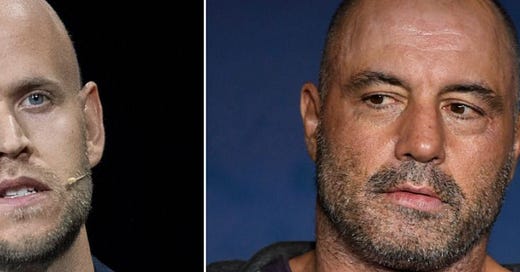Spotify's plan for world domination
Free speech crusaders who focus on the Rogan controversy are missing the big picture
“I want to make one point very clear,” Spotify CEO Daniel Ek wrote on February 6 in a memo to employees about the Joe Rogan controversy. “I do not believe that silencing Joe is the answer.” After all, he continued, “canceling voices is a slippery slope.”
Two days before that, though, Spotify pulled 71 episodes of Rogan’s podcast off its podcast app. After a mashup of Rogan’s past use of the N-word surfaced, and a Black singer took her music and her podcast off Spotify in response, Ek had consulted urgently with Rogan and then removed the episodes, which presumably have damaging mashup potential of one kind or another. And, since Spotify is the only distributor of Rogan’s podcast—a privilege it’s reportedly paying $100 million for—those episodes aren’t available on any other podcast apps, either.
You’ve got to hand it to Ek: It’s not easy to position yourself as a guardian of free speech while flushing hundreds of hours of speech down the (as Orwell put it in 1984) memory hole. But the positioning was successful. The New York Times piece about both Ek’s memo and his removal of the Rogan episodes had this as its headline: “Spotify Stands by Joe Rogan: ‘Canceling Voices Is a Slippery Slope’ ”.
And that was the tone of pretty much all the coverage—numb to irony. I couldn’t find any headlines that said, “Joe Rogan, uncompromising free-speech warrior, agrees to vaporize four months’ worth of his work to stem woke outrage.”
I don’t really blame journalists at the Times or anywhere else for this numbness. It’s a condition of our times! When your country is polarized, issues seem stark: There are two sides, and everyone belongs on one side or the other, standing shoulder to shoulder with their comrades, staring at the enemy across territory that isn’t gray.
So, on the one hand, you’re not going to hear many of Rogan’s anti-cancel-culture allies complaining about those 71 expunged episodes; they can’t break ranks in times of war!
And, on the other hand, you’re not going to hear many Rogan critics hail the expunging—even though it was paired with a seemingly heartfelt Rogan apology that included a vow never to use the N-word again—as any kind of victory; nothing short of unconditional surrender will do!
I think this tribal mindset is one reason discussion of the Rogan-Spotify controversy has been pretty much devoid of clarifying effect. Which is too bad, because, if you ask me, the controversy is a good vehicle for clarifying a couple of things:
1. Though the ‘cancel culture’ issue is important, and free speech crusaders are right to pay attention to it, I think they’re wrong to spend much ammo on this particular controversy. For reasons I’ll explain, the Rogan-Spotify issue isn’t nearly as high stakes as some other big-tech/free-speech issues.
2. Still, the Rogan-Spotify relationship probably deserves more attention from free speech crusaders than it’s getting. Because there’s another irony about Daniel Ek being cast as a guardian of free expression: His business model is hastening the day when podcasters with unpopular views will have more trouble getting heard. I think there’s a good chance that, a decade from now, free speech crusaders will see the Rogan-Spotify alliance as having been a harbinger of bad things to come.
Let’s start by taking a closer look at some of the misleading things Ek has been saying about the Rogan controversy. But I want to emphasize that this isn’t some kind of indictment of Ek. Part of a CEO’s job is to generate bullshit when bullshit is good for the company!
And, actually, Ek is less of a bullshitter than some CEOs. Mark Zuckerberg says Facebook’s mission is to “give people the power to build community and bring the world closer together.” Compare that to the mission statement Ek laid out a few days before the N-word controversy (back when the Rogan controversy was still about Neil Young leaving Spotify over Rogan’s sympathetic conversations with vax skeptics). In a town hall meeting with employees, Ek said: “I want to remind everyone of our mission. We want to get to 50 million creators and a billion users.”
Inspiring? No. Refreshing? Yes!
Ek then added that, to “achieve this ambition, it’s really critical that creators are able to use their voice independently.” That’s about as close as you can realistically expect him to come to saying, “When I said cancellation could be a ‘slippery slope,’ I meant a slope that leads to a low Spotify stock price.”
Still, notwithstanding flashes of commendable quasi-honesty, Ek has thrown up a fair amount of obfuscation.



